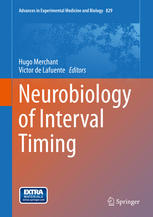

Most ebook files are in PDF format, so you can easily read them using various software such as Foxit Reader or directly on the Google Chrome browser.
Some ebook files are released by publishers in other formats such as .awz, .mobi, .epub, .fb2, etc. You may need to install specific software to read these formats on mobile/PC, such as Calibre.
Please read the tutorial at this link: https://ebookbell.com/faq
We offer FREE conversion to the popular formats you request; however, this may take some time. Therefore, right after payment, please email us, and we will try to provide the service as quickly as possible.
For some exceptional file formats or broken links (if any), please refrain from opening any disputes. Instead, email us first, and we will try to assist within a maximum of 6 hours.
EbookBell Team

4.3
28 reviewsThe study of how the brain processes temporal information is becoming one of the most important topics in systems, cellular, computational, and cognitive neuroscience, as well as in the physiological bases of music and language. During the last and current decade, interval timing has been intensively studied in humans and animals using increasingly sophisticated methodological approaches. The present book will bring together the latest information gathered from this exciting area of research, putting special emphasis on the neural underpinnings of time processing in behaving human and non-human primates. Thus, Neurobiology of Interval Timing will integrate for the first time the current knowledge of both animal behavior and human cognition of the passage of time in different behavioral context, including the perception and production of time intervals, as well as rhythmic activities, using different experimental and theoretical frameworks. The book will the composed of chapters written by the leading experts in the fields of psychophysics, functional imaging, system neurophysiology, and musicology. This cutting-edge scientific work will integrate the current knowledge of the neurobiology of timing behavior putting in perspective the current hypothesis of how the brain quantifies the passage of time across a wide variety of critical behaviors.